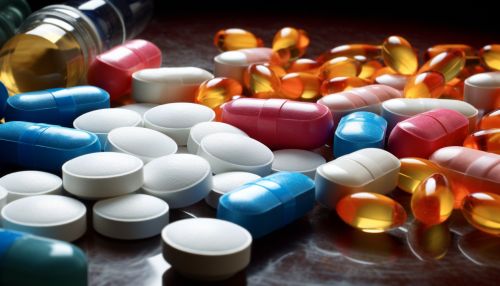Drugs
Introduction
Drugs are substances that produce a physiological effect when introduced into the body. They can be categorized into two broad groups: pharmaceutical drugs, which are designed for medicinal purposes, and recreational drugs, which are substances people use to enhance their experiences, alter their consciousness, or achieve a desired psychological effect.


Pharmaceutical Drugs
Pharmaceutical drugs, also known as medicines, are chemicals used to diagnose, treat, or prevent diseases. They are typically produced in laboratories and are subject to rigorous testing and regulation before they can be prescribed to patients.
Drug Discovery and Development
The process of drug discovery involves the identification of candidates, synthesis, characterization, screening, and assays for therapeutic efficacy. Once a compound has been identified as a potential drug, it undergoes pre-clinical trials, which involve testing on non-human subjects to evaluate its safety and efficacy. If the drug passes these trials, it moves on to clinical trials, where it is tested on human subjects.
Drug Classification
Pharmaceutical drugs are classified in various ways. One of the key divisions is by level of control, which distinguishes prescription drugs, which require a medical prescription to be dispensed, from over-the-counter drugs, which can be purchased without a prescription. Other ways to classify medicines are by mode of action, route of administration, biological system affected, or therapeutic effects.
Recreational Drugs
Recreational drugs are chemical substances that people use for enjoyment, rather than for medical reasons. These can include legal substances, such as alcohol and tobacco, as well as illegal drugs like cannabis, methamphetamines, and heroin.
Effects and Risks
Recreational drugs can have a wide range of effects on the body and mind. Some, like alcohol, have a depressant effect, slowing down the body's functions and the brain's activity. Others, like cocaine, are stimulants, increasing the body's functions and the brain's activity. Still others, like cannabis, have a hallucinogenic effect, altering perception and mood.
Recreational drug use carries a number of risks, including addiction, physical harm, and mental health issues. It can also have legal consequences.
Drug Policy and Legislation
Drug policy refers to the laws and regulations that govern the manufacture, sale, and use of drugs. These policies can vary greatly from one country to another, and they often reflect societal attitudes towards drug use.
In some countries, certain drugs are completely banned, while in others they are regulated but not banned. Some countries have adopted harm reduction approaches to drug policy, focusing on reducing the negative health and social impacts of drug use rather than on punishing users.
